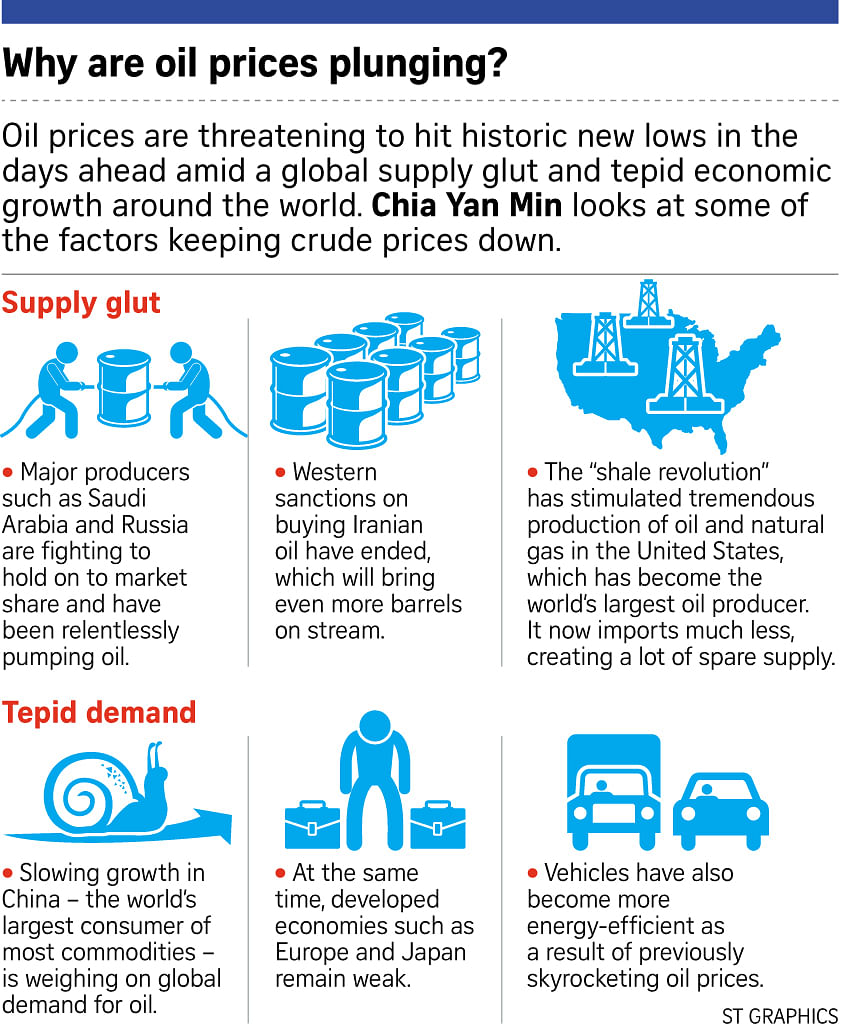The relentless decline in crude oil prices to 12-year lows spells trouble for job seekers in energy-related fields here, say recruitment specialists.
The number of jobs is dwindling while those already employed in the industry face pay cuts as firms move to rein in costs.
Mr Brett Marsh, managing director of South and Central Asia at EarthStream Global, told The Straits Times yesterday that the number of job vacancies across the oil and gas and offshore sectors has fallen by more than half over the past 12 months.
"Many of those jobs affected are high-cost related functions, such as specialist engineers," noted Mr Marsh. "Companies are not signing off these budgets because projects have been put on hold and new vessels are not being chartered to the extent they were previously.
"It's a knock-on effect from the low oil prices, because these organisations are stimulated by projects. Without a continuous pipeline of projects, it's just not economical to hire."

Energy and offshore firms here have been hit hard since anaemic global demand coupled with a still-growing supply glut started sending oil prices falling sharply in June 2014.
Oil majors such as Shell and Chevron have announced plans to axe jobs by the thousand across their global operations, while smaller players here, including Vard Holdings, Ezra Holdings and Otto Marine, have taken steps to reduce their headcount.
The downturn in the industry shows little sign of abating, especially with Brent crude sliding below US$30 a barrel for the first time since 2004 last week.
Mr David Leong, managing director of human resource firm People Worldwide Consulting, said the oil and gas industry is witnessing a "severe contraction" in hiring as many companies are bracing themselves for a protracted dry spell.
Besides reducing staff, pay cuts are also on the table, noted Mr Leong, with some companies slashing salaries by 20 per cent while lowering wages for incoming staff by 10 to 15 per cent.
A typical general manager could see his monthly salary of $15,000 cut to $12,000.
"Generally, the market is freezing up and salaries will likely head even lower or, at best, stay at the same level," he said.
Mr Leong also noted that companies are increasingly opting for contractors instead of making permanent hires under their own payrolls, which translates to lower costs.
"The demand for contractors has grown somewhat as the main yards and owners are outsourcing production parts and assembly to contractors," he said.
"The outlook is bleak, particularly for the major players in the field. Many owners and large contractors in the key markets are going under and filing for bankruptcy and this will have a severe impact for downstream players in Singapore."
Mr Marsh said: "It's a challenging year ahead, particularly as oil prices are expected to continue to go downwards.
"Even if you do see an uplift in oil prices, it will have to be sustained over a period of time before there is any effect on the (labour) marketplace."
Recruitment firm Hays noted in a recent report on the oil and gas sector that job security has been a big issue for many over the past 12 months and "promises to be so for the coming year also".
Jacqueline Woo
Correction note: An earlier version of the graphic stated that though the US does not export crude oil, it now imports much less, creating a lot of spare supply. This is incorrect. The US made its first export of crude oil in four decades earlier this month.

